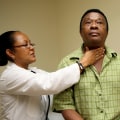Routine medical care that includes exams, checkups, and patient counseling to prevent illness, illness, or other health problems.
preventive
health care, or prophylaxis, consists of measures taken for the purpose of disease prevention. Illness and disability are affected by environmental factors, genetic predisposition, disease agents, and lifestyle choices, and are dynamic processes that begin before people realize they are affected. Disease prevention is based on anticipatory actions that can be classified as primary, primary, secondary and tertiary prevention.Preventive care is what you do (before you get sick) to stay healthy. So why should you go to the doctor when you're healthy? The simple answer is that preventive care can help you stay healthier and, as a result, lower your healthcare costs. Preventive care helps detect or prevent serious illnesses and medical problems before they get worse. Annual checkups, vaccines and flu shots, as well as certain tests and screenings, are some examples of preventive care.
This is also called routine care. These behaviors are modifiable, and public health and prevention efforts could make a difference in reducing these deaths. The concept of primary prevention has been created much more recently, in connection with new advances in molecular biology in the last fifty years, more particularly in epigenetics, which point to the paramount importance of environmental conditions, both physical and affective, in the organism during its fetal life and in the newborn born, or the so-called primitive period of life. Professionals in this specialty combine skills and experience in clinical care and public health to support the transformation of health systems and rebuild them, based on the prevention of illness, injury and death.
A QALY considers duration and quality of life, and is used to assess the cost-effectiveness of medical and preventive interventions. Finally, tertiary prevention seeks to reduce the damage caused by symptomatic illness by focusing on mental, physical and social rehabilitation. Goldston (198) notes that these levels could be better described as prevention, treatment and rehabilitation, although the terms primary, secondary and tertiary prevention are still used today. In each of them, preventive medicine physicians affect health care delivery and health outcomes at the individual, practice, community and level.
With lifestyle factors, such as diet and exercise, which are at the top of the statistics of preventable deaths, the economy of a lifestyle healthy is a growing concern. Secondary prevention deals with latent diseases and attempts to prevent an asymptomatic disease from progressing to a symptomatic disease. They apply their expertise in medicine, social, economic and behavioral sciences to improve the health and quality of life of individuals, families, communities and populations through disease prevention and health promotion. Whether you believe that American medicine is starting to focus on preventive health care for economic or philanthropic reasons, the fact is that doctors, hospitals and scientists are questioning the status quo.
Preventive health care strategies are described as being implemented at the primary, primary, secondary and tertiary levels of prevention. The Robert Wood Johnson Foundation evaluated the literature on cost-effectiveness of prevention and found that many preventive measures meet the 60% benchmark in certain populations. Primary prevention refers to measures designed to prevent the development of risk factors in the first place, early in life. .







